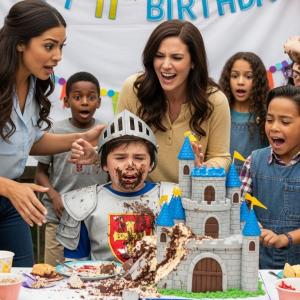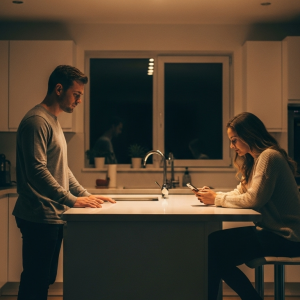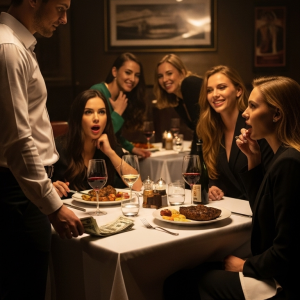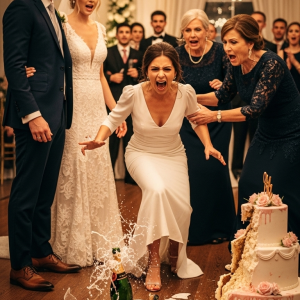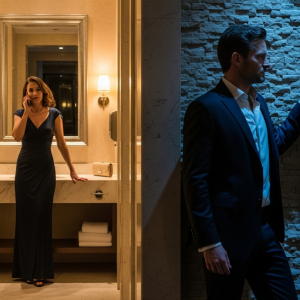The scent of pine from the towering Christmas tree did little to mask the stale air of obligation hanging in my father’s house. For the first time in seven years, our family was assembled under one roof, a collection of orbits that had long ago drifted apart, now forced back into a fragile alignment by the gravity of tradition.
My older brother, Michael, his wife, Andrea, and their nine-year-old son, Levi, had just arrived from Berlin. They swept in with a flurry of winter coats and oversized suitcases, their laughter a little too loud, a little too bright.
“Todd, the house looks absolutely wonderful! So festive!” Andrea exclaimed, giving my father a hug that he accepted with a stiff pat on her back.
Michael clapped a hand on my shoulder. “Told you nothing would have changed, honey. Right, Will? Dad’s a traditionalist.” His grin was wide, but it didn’t quite reach his eyes. There was a weariness there, the shadow of a story he wasn’t telling.
“It’s good to have you home,” I said, and the words felt like a foreign language in my mouth. For years, this house had been a sanctuary of quiet order, first with just my mother, and after she passed, with my father and me. Now, it felt like a stage for a play I had no desire to be in.
Levi, a whirlwind of unchecked energy, immediately began exploring. He darted from room to room, his voice echoing off the walls. “Is this my room? How come I don’t have a TV in here? Grandpa, can we get a TV?”
Andrea just chuckled, waving a dismissive hand. “Oh, let him be. He’s just got so much spirit after being cooped up on that plane.”
I retreated to my corner, opening my laptop. It was more than a work device; it was my shield. The neat, logical lines of code were a comfort against the encroaching chaos of my family. I was a remote software engineer, and a critical server migration waited for no holiday.
A shadow fell over my screen. It was Levi, peering intently at my work. “What’s all that?” he demanded, pointing a sticky finger dangerously close to the screen.
“It’s just work, Levi,” I said, gently angling the laptop away. “It’s very complicated. Maybe you could go see what Grandma Andrea is doing?”
“Looks boring,” he declared. He noticed the can of soda on the small table beside me. “Can I have that?”
“No, Levi, that’s mine. And please be careful around the electronics.”
He scoffed, a sound of pure disdain that was unnervingly adult. “It’s just a computer. Dad says if something breaks, we can just buy a new one. We have lots of money.”
A bitter taste filled my mouth. The “soured investment” story was clearly a carefully edited version of the truth. Before I could formulate a response that was both firm and peace-keeping, he acted.
He picked up the can. His movements weren’t clumsy or accidental. They were deliberate, unhurried, as if he were conducting a science experiment. He tilted it over my keyboard.
A sticky, brown cascade of soda fizzed and bubbled, seeping between the keys. I recoiled with a sharp, involuntary “Hey!” and scrambled to snatch the laptop away, but it was too late. The screen flickered, displayed a series of fractured, colorful lines, and went black.
“Levi, what did you do?” I yelled, the shock turning instantly to a hot surge of anger. “I told you to be careful!”
Levi just stood there, watching the dead screen, his face a mask of detached curiosity. For a fleeting second, I thought I saw panic, the realization that he had finally gone too far. But it was gone in an instant.
He then looked directly at me. His expression was cold, hard, and utterly devoid of remorse. Slowly, with a performer’s sense of timing, he raised his small hand, curled his fingers into a fist, and extended one single, defiant finger.
My mind went blank. The deadlines, the lost data, the thousands of dollars in equipment—all of it vanished. All that remained was the chilling clarity of that gesture. It wasn’t a childish imitation. It was a calculated strike, a declaration of dominance from a boy who had been raised to believe he was the center of the universe, and that all other celestial bodies, including me, were merely there for his amusement or destruction.
I found them by the Christmas tree, a perfect portrait of familial bliss. Andrea was adjusting an ornament, laughing at something Michael said. Levi was nestled against her side, looking for all the world like a cherubic angel. The hypocrisy of it was suffocating.
“Andrea, Michael,” I said, my voice tight. “We need to talk. Now.”
Andrea turned, her smile faltering at my tone. “William, what is it? You look like you’ve seen a ghost.”
“Your son just poured an entire can of soda on my work laptop. It’s destroyed.”
Her hand flew to her mouth in a gesture of performed shock. “Oh, my goodness! Levi, did you have an accident?” She turned to him, her voice dripping with sympathy, not accusation.
“It wasn’t an accident,” I stated, my voice flat. “He did it on purpose. And then he—” I couldn’t bring myself to describe the gesture. It felt too crude, too ugly for this room of festive lies.
Michael stepped in, placing himself between me and his family. “Alright, Will, calm down. I’m sure he didn’t mean it. He’s a kid. They spill things. It’s what they do.”
“He looked me in the eye while he did it, Michael. And then he was incredibly disrespectful.”
“Disrespectful?” Andrea repeated the word as if she’d never heard it before. “William, he’s nine. I think you’re being a little overly sensitive. It’s Christmas Eve, for heaven’s sake. Let’s not ruin it.”
I stared at them, my frustration building into a silent scream. They weren’t listening. They were managing me, handling the situation, trying to smooth over the disruption so their perfect holiday could continue. From behind his mother’s leg, I saw Levi’s triumphant smirk. He knew he had won.
Dinner was agony. The clinking of silverware against porcelain was the only sound that punctuated the painfully stilted conversation. We talked about the weather. We talked about German Christmas markets. We talked about anything and everything except the dead laptop and the toxic disrespect that sat between us.
My father, Todd, presided over it all from the head of the table. He ate his turkey slowly, his gaze moving from face to face. He was a retired history teacher, a man who understood that the most significant battles are often fought in silence, and he was watching this one unfold with the patience of a seasoned general.
I couldn’t eat. The lie was a stone in my stomach. Finally, I pushed my chair back and placed my phone on the table. “I have security cameras in my workspace,” I announced to the room. “The company requires it for the project I’m overseeing.”
Every eye snapped to me. I pressed play.
The grainy video was brutally clear. The deliberate tilt of the can. The fizzing disaster. And then, the small hand, the single finger, aimed directly at me. The silence that followed was different. It wasn’t empty; it was charged, humming with a voltage that could arc at any moment.
Andrea was the first to recover, her voice dripping with wounded indignation. “Honestly, William, I can’t believe you. You would record your own nephew and then play it for everyone like some sort of prosecutor? To embarrass a child? What has gotten into you?”
“Embarrass him?” I shot back, incredulous. “He destroyed my property and mocked me! I’m not the one who should be embarrassed, Andrea!”
Michael slammed his hand on the table, making the glasses jump. “That’s enough! So he made a gesture. He’s a kid! He probably saw it on YouTube. You’re the adult here. You’re supposed to be the bigger person!”
“Being the bigger person doesn’t mean I have to accept being treated like this in my own home!” I was nearly shouting now. “This isn’t about the laptop, Michael! It’s about respect! It’s about the fact that your son acts like he’s above the rules because you’ve never given him any!”
“Enough.”
My father’s voice, though quiet, cut through the chaos like a razor. He rose from his chair, his presence suddenly dominating the room. His eyes, cold and clear, fixed on Levi.
“Levi. You will look at your uncle and you will apologize. Now.”
Levi’s face crumpled. His eyes darted to his mother, a silent, desperate plea for his usual rescue. Andrea opened her mouth, a protest already forming, but my father’s gaze shifted to her, and the words died in her throat.
“I… I didn’t do anything wrong!” Levi wailed, the ingrained defiance finally cracking under the weight of this new, unyielding authority. He scrambled from his chair and fled, his footsteps pounding up the stairs, a frantic retreat from a judgment he had never before had to face.
The next morning, the festive decorations seemed to mock the funereal silence of the house. We moved like ghosts, the air thick with unspoken words. I hadn’t slept, replaying the confrontation in my head, a bitter loop of denial and disrespect.
My father summoned us to the living room after a breakfast no one touched. Michael and Andrea sat on the sofa, a wall of resentment between them. Levi was wedged in the middle, his attention completely absorbed by a gleaming new iPhone, a Christmas gift that now felt like a medal for his bad behavior.
My father stood before the cold fireplace, his posture rigid. He looked at Michael and Andrea, his expression etched with a deep, weary disappointment.
“I have been thinking about what happened last night,” he began, his voice calm and measured. “And I have realized that the problem is not a nine-year-old boy. The problem is his parents.”
Michael flinched as if struck. “What is that supposed to mean?”
“It means,” my father continued, his gaze unwavering, “that you have confused love with indulgence. You have protected him not from the world, but from reality. You are not raising a son; you are cultivating a tyrant. And last night, William was simply the first casualty.”
He then turned to me. “And you, William. You are not without fault. You have valued a false peace over the hard truth for years. You thought you were holding this family together with your silence, but you were just letting the poison spread.”
His eyes finally landed on Levi, who had reluctantly looked up from his game. “Choices have consequences, son. That is the most important lesson in life. And it is a lesson you are going to learn today.”
With slow, deliberate movements, my father walked to Levi. He gently took the new iPhone from his hands. Levi was too stunned to resist. My father then walked to the coffee table, where his half-full mug of black tea was still steaming.
He held the phone over the mug.
Andrea gasped. “Todd, don’t. Please. That phone cost a fortune. It’s his property!”
My father’s voice was quiet but carried the weight of absolute authority. “And William’s laptop? The tool he uses to feed himself? His property was worth less? Your son destroyed it, and his only consequence was this new toy. What lesson do you think that teaches him?”
Without another word, he dropped the phone into the hot tea.
Plink. Ssssssss.
The sound was shockingly final. The screen flickered for a horrifying second and then went black.
“You had no right!” Michael roared, finally finding his voice and lunging to his feet.
My father didn’t even flinch. He met his son’s furious gaze. “I have every right. This is my house. The house your mother and I built on a foundation of respect, honesty, and accountability. Principles you seem to have forgotten.”
He took a step closer to Michael, his voice dropping. “This family is cracking because we have stopped holding each other to those standards. You are so afraid of upsetting your son that you are willing to let him become a person neither you nor I would respect. It stops. Today.”
He then issued his final, non-negotiable terms. “You will buy William a new laptop. You will use your own money. And Levi,” he said, turning to his grandson, who was now staring at the submerged phone with wide, tearful eyes. “You will go to your room. You will have no games, no phone, no television. You will sit there and think about what you have done. You will not come out until you can apologize to your uncle, and until I believe you mean it.”
The room was silent save for Andrea’s muffled sobs. Michael stood frozen, the anger on his face having collapsed into a dawning, horrified understanding. For the first time, Levi was utterly alone, his shield of parental excuses shattered, leaving him exposed to a world where actions, finally, had consequences.
The drive to the “Youth Accountability Camp,” as the brochure called it, was a long, silent hour. Michael drove, his knuckles white on the steering wheel. I sat in the passenger seat, and Levi was in the back, a sullen, silent statue staring out the window.
Halfway there, Michael cleared his throat. “Dad was right,” he said, his voice rough. “I saw the look on his face. My son’s face. It was… arrogant. I taught him that. Andrea and I… we taught him that.” It was the first honest thing he’d said in days.
The weeks Levi was away were strange. The house was quiet, but it was a healing quiet, not a tense one. Michael, Andrea, and my father started talking. Really talking. They talked about their fears, their failures, and the ghost of my mother, whose gentle strength they all admitted they had failed to live up to.
One evening, Michael and I were alone in the kitchen. He handed me a beer. “The new laptop arrives tomorrow,” he said. “I used the money from selling my watch. The one from Berlin.”
I didn’t know what to say. “You didn’t have to do that.”
“Yes, I did,” he said, finally meeting my eyes. “It’s not about the money, Will. It’s about… starting to fix things. I’m sorry. For everything. For letting him treat you like that. For being a terrible brother.”
A month later, a letter arrived for me. The handwriting was a childish scrawl.
Dear Uncle Will,
I am sorry. I broke your computer. It was wrong. Grandpa says being sorry isn’t just words, it’s changing. I am trying to change. I hope you can forgive me.
Liebe Grüße (Kind regards), Levi
When he came home, he was different. Quieter. More thoughtful. The restless, demanding energy had been replaced by a cautious calm. The first thing he did was walk into my office, where I was setting up the new laptop.
He stood in the doorway for a long moment. “Can I help?” he asked softly.
I looked at him, truly looked at him, and saw not the defiant child from Christmas, but a boy trying to find his way back. I smiled, a real, genuine smile.
“Yeah, Levi,” I said. “You can plug this in for me.”
Our family is not perfect. The cracks that were revealed that Christmas will always be there, scars to remind us of how close we came to falling apart. But we are stronger now, held together not by the fragile pretense of peace, but by the hard-won, resilient strength of the truth.
